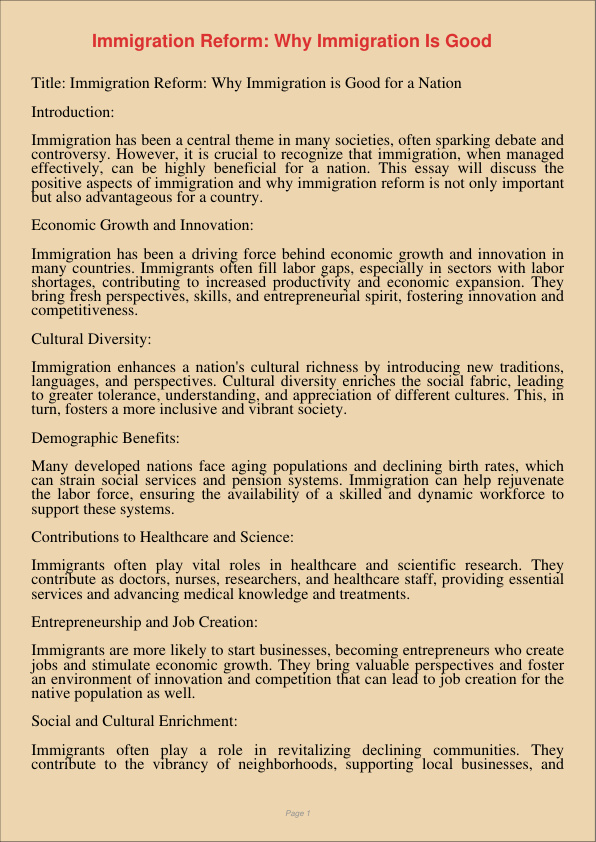Immigration Reform Why Immigration Is Good
Jan 9, 2024
immigration reform
immigration
Religion and Theology
Business

Title: Immigration Reform: Why Immigration is Good for a Nation
Introduction:
Immigration has been a central theme in many societies, often sparking debate and controversy. However, it is crucial to recognize that immigration, when managed effectively, can be highly beneficial for a nation. This essay will discuss the positive aspects of immigration and why immigration reform is not only important but also advantageous for a country.
Economic Growth and Innovation:
Immigration has been a driving force behind economic growth and innovation in many countries. Immigrants often fill labor gaps, especially in sectors with labor shortages, contributing to increased productivity and economic expansion. They bring fresh perspectives, skills, and entrepreneurial spirit, fostering innovation and competitiveness.
Cultural Diversity:
Immigration enhances a nation’s cultural richness by introducing new traditions, languages, and perspectives. Cultural diversity enriches the social fabric, leading to greater tolerance, understanding, and appreciation of different cultures. This, in turn, fosters a more inclusive and vibrant society.
Demographic Benefits:
Many developed nations face aging populations and declining birth rates, which can strain social services and pension systems. Immigration can help rejuvenate the labor force, ensuring the availability of a skilled and dynamic workforce to support these systems.
Contributions to Healthcare and Science:
Immigrants often play vital roles in healthcare and scientific research. They contribute as doctors, nurses, researchers, and healthcare staff, providing essential services and advancing medical knowledge and treatments.
Entrepreneurship and Job Creation:
Immigrants are more likely to start businesses, becoming entrepreneurs who create jobs and stimulate economic growth. They bring valuable perspectives and foster an environment of innovation and competition that can lead to job creation for the native population as well.
Social and Cultural Enrichment:
Immigrants often play a role in revitalizing declining communities. They contribute to the vibrancy of neighborhoods, supporting local businesses, and contributing to the local economy.
Humanitarian Responsibility:
Immigration reform can address the needs of refugees and asylum seekers, fulfilling a country’s humanitarian responsibilities. Offering sanctuary to those in peril is a reflection of a nation’s values and moral duty.
Global Reputation:
A nation that embraces immigration is often viewed more favorably on the global stage. It demonstrates an open and inclusive attitude, potentially fostering international collaborations and partnerships that benefit the nation economically, culturally, and diplomatically.
Conclusion:
Immigration, when managed effectively through comprehensive immigration reform, is undoubtedly good for a nation. It brings economic growth, cultural diversity, demographic benefits, contributions to healthcare and science, entrepreneurship, job creation, social and cultural enrichment, and fulfillment of humanitarian responsibilities. Embracing immigration is not only beneficial for a nation’s future but also aligns with the principles of compassion, inclusivity, and progress. By recognizing the advantages of immigration, societies can work toward immigration policies that are fair, just, and in the best interest of the nation as a whole.